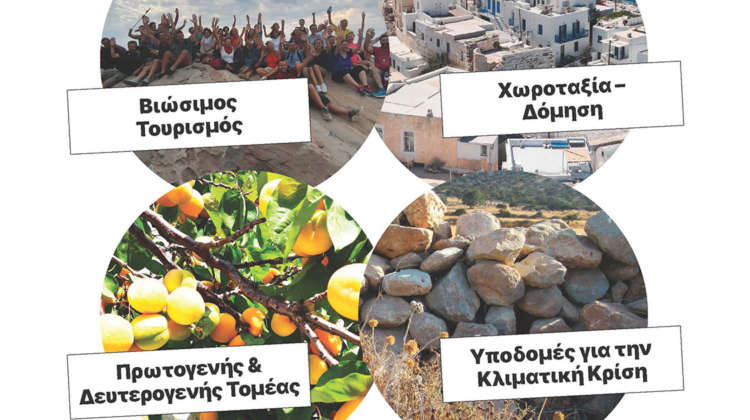
Extracts from a scientific conference
By Tonia Pandeleou
The “Strategies for Sustainability” conference was held on May 5th and 6th, 2023, at the EPAL Paros Hall. The Association of Friends of Paros and Antiparos organised the conference with three other Parian Associations: the Association of Lefkiana of Athens, the Cultural Association of Aggeria and the M.E.A.S. of Lefkiana YRIA. The event consisted of four sessions that focused on topics such as Sustainable Tourism, Primary and Secondary Sectors, Spatial Planning and Building, and Infrastructure for the Climate Crisis.
During the conference, we discussed various concepts like Sustainability, Climate Crisis, Circular Economy, Cultural/Thematic tourism, Cooperation Networks, Participatory Spatial Planning, etc. These topics should be at the forefront of our minds when considering the future of our community. The conference was an opportunity for our fellow citizens to participate in a public debate and share their thoughts on these issues. It was the first time that many of these concepts were addressed in a public forum in Paros.
During the first session on Sustainable Tourism, Yannis Spilanis emphasised that the current tourism model, which relies on the “sun-sea-sand” triptych, has become unsustainable due to the additional burdensome characteristics of “tourism of (uncontrolled) Real Estate”. This model has generated significant income in the past. Still, overconsumption of resources and significant burdens on the local community and the natural environment now pose a threat to long-term sustainability and may lead to a collapse of tourism as a whole. Furthermore, profits will increasingly fall into the hands of large investors and developers instead of being distributed to small and medium-sized professionals and the local community. Therefore, it is crucial to promote the unique characteristics of places, people, nature, and history to support the productive capacity, resourcefulness, and cohesion of the inhabitants, as well as the natural and man-made environment of our island, while ensuring the well-being of local communities.
Yannis Spilanis also mentioned the favourable characteristics of Cycladic destinations for soft tourism. A survey conducted by the Sustainable Tourism Observatory (which he directs) shows that in the Cyclades, small tourist accommodations and three-star hotels generate higher profits per tourist than luxurious five-star hotels with extremely high environmental costs. This indicates that wasting precious natural resources does not necessarily lead to greater profitability, even in the short term.
Ronia Anastasiadou talked about the potential of thematic tourism and the special bond it can create between people and places. She used examples from her own experience in Sifnos to explain her point. Dimitra Skandali, a Parian artist, described the original and specialised cultural tourism project she has created and operates in Aliki, Paros. She combines her own artistic interests with the island tradition of her family to create an ideal place for hosting foreign artists.
Michalis Konitopoulos, representing the Aliki Tourist Accommodation Association, stressed the importance of highlighting the identity of the place to ensure a tourism standard based on quality and respect for the place and its people. He raised questions about the priority and impact of the major infrastructure projects currently underway on the island, including the airport that is set to bring even more visitors to an island that has failed to provide sufficient infrastructure for years.
During the second session on the Primary and Secondary Sectors, the participants discussed the possibility and importance of creating synergies between the tourism industry and the productive activities on the island. Sophia Karabela shared examples of successful Producer Cooperation Networks from around the world that have been able to increase profitability and product quality. Stavros and Katerina Tsavalos, as well as Manos Stavrianos, provided examples of agricultural and manufacturing activities that are currently taking place on the island. One particularly interesting presentation was given by Alexis Gokas, who shared research data conducted by the Agricultural Cooperative of Paros under his scientific guidance. Apostolos Avgelis also presented his work to preserve local grape varieties with specific adaptation and resistance and create healthy propagation material for these varieties.
During the third session, Maria Markou, Monica Themou, and Eleni Maistrou discussed Spatial Planning and Building, a crucial issue for the island’s future. They emphasized the importance of participatory spatial planning, where citizens are given the opportunity to make proposals after being well-informed about the consequences of any spatial regulation. Unfortunately, this is not happening in Greece, creating a democratic vacuum. The speakers also talked about the significant gaps and delays in Greece’s spatial planning procedures, such as the non-existence of a Special Spatial Plan for Tourism. They also mentioned the problem of “strategic investments in tourism,” which poses a serious threat to the environmental and social cohesion of the Cycladic area. Archontoula Vassilara provided insight into the traditional settlements of Paros and informed the audience that her team at the Technical University of Athens intends to study and record their data.
During the fourth and last session, the speakers discussed the additional risks arising from the rapidly increasing climate crisis, which is expected to affect islands like Paros severely. Mr Nikos Chrysogelos stressed the need for proposals to fortify the islands against these risks. Nikos Stappas spoke about the proper management of streams to prevent catastrophic flooding, which, combined with the overbuilding of the island and erosion of the cultivated land, poses a serious threat to Paros. The presentation of VIOTEV, which recycles agricultural residues into cleaning products, by its initiator, Mr. Timo Venetsiano, was also of interest.
In conclusion, the two-day event made it clear that Paros is at a crucial crossroads. The island can either continue with one-way growth in numbers, disregarding the many unpleasant consequences that this will bring, or support a soft tourism model that protects the unique environmental and cultural wealth of the island. The live broadcast was watched by hundreds of people, indicating that these issues are of national concern. Several of the presentations are available on this website.

Leave a Reply